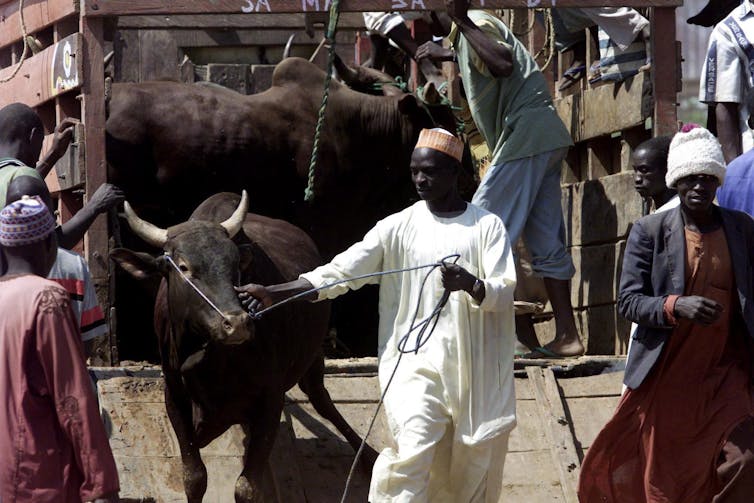
Ifeanyi Onwuzuruigbo, University of Pretoria
Northern Nigeria has become a thieving and killing field for cattle rustlers who maraud the region’s ungoverned forests, stealing cattle and killing herders.
Attacks have taken place in in Benue, Nassarawa and Plateau states in north-central Nigeria and the situation appears to be worsening. In January alone last year 371 people were killed by cattle rustlers in the northwestern state of Zamfara.
Commercial farms, including those owned by influential politicians, revered clerics and prominent traditional rulers, haven’t been spared. Former Vice-President Namadi Sambo, the Emir of Zazzau, Alhaji Shehu Idris and Benjamin Kwashe, the Anglican Bishop of Jos, have all lost herds to rustlers.
Three main reasons are usually given for the rise of cattle rustling in Nigeria. One is pastoral culture and tradition. The second is climate change. And the third has to do with state failure and proliferation of light weapons across Africa.
The problem with these explanations, however, is that they ignore one critical aspect: the role of ungoverned forests. My research shows that ungoverned forests provide an enabling environment for cattle banditry to flourish in northern Nigeria.
Reasons for rustling
Pastoral culture and tradition is one of the major reasons for cattle rustling in Nigeria. It encourages cattle theft as a way of replenishing stock after losing herds to drought. Some traditions exclusively confer cattle husbandry to nomads and recommend rustling against non-pastoral groups who dare to rear cattle.
The second is climate change. Researchers confirm that climate change has triggered the shrinking of Lake Chad. This has furthered the desertification of northern Nigeria.
Read more: Why clashes are on the rise between farmers and herdsmen in the Sahel
As herders migrate from the north in search of greener pastures in the Middle Belt and Southern regions their herds are often plundered by bandits and marauding Boko Haram militants.
Thirdly, cattle rustling is attributed to state failure, intra-state wars and the proliferation of light weapons in Africa.
This leads to countries becoming what’s described as fragile states. Nigeria is no exception. In addition to its internal political, economic, and domestic terrorism challenges, the country is geographically located in the conflict-ridden Sahel region.
Weapons and arms flowing from these war zones are ferried through Nigeria’s unmanned borders into the hands of criminal groups, which include cattle rustlers.
These three factors are rightly cited as facilitating the cattle rustling scourge. But, based on my research, I’d argue that the main reason for the continued existence of cattle bandits is the lack of effective governance of Nigeria’s forests.
Ungoverned forests
Northern Nigeria covers about 60% of Nigeria’s land area and hosts a large expanse of forest land. The government has designated one third of the region’s land mass as official forest reserves.
With a rich repertoire of plants, animals, streams, river tributaries, and waterfalls, the forests crisscross rural communities and towns in the region.
Boko Haram terrorists operate the most clandestine and sophisticated network of cattle rustlers and sellers within these forests. They have taken control of the Sambisa forests, a land mass which is estimated to be the size of Lagos.
They have been able to do this because the forests have been neglected for years. They are unmanned, unpoliced, acutely underfunded and poorly managed. Like other government agencies, forestry departments are hugely understaffed and operate on lean budgets that are often mismanaged.
Forestry policy also adopts a top-to-bottom approach that disregards host communities. When these communities are alienated they are less inclined to take “ownership” of the forests.
So, the forests become a hotbed of criminals and safe haven for cattle bandits. Boko Haram’s seizure and subsequent occupation of Sambisa forests, for instance, has been blamed on years of government neglect and community apathy.
Read more: How poor management of Nigerian forests led to exploitation by criminals
Managing the menace
The Nigerian government only started to respond to cattle rustling in 2014. Yet the plague has been on a steady rise for more than 10 years. Government response has been slow and lethargic and policy discussions have not yet translated into concrete policy actions.
Its strategies for combating cattle banditry have either involved uncoordinated police action or un-sustained military exercises. For instance, Operation Ayem Apatuma, organised in 2018 to tackle cattle rustling in Nigeria’s north-central region, was too short to make any lasting impact. It ended after three months.
The government must review its approach to cattle banditry. It needs a clear and specific policy. One aspect of this should be an effort to move herders away from open grazing and encourage them to embrace modern ranching practices. Confining the movement of cattle to ranches ensures a higher level of security and reduces their nuisance value.
The government must also reassess forest governance so that the management of forests becomes an inclusive practice that takes people’s needs into account. In addition, forest guards need to be empowered and equipped to discharge their duties effectively.
The government will also need to liberate the Sambisa forests from Boko Haram’s control. This would allow for the establishment of cattle colonies within the forests lands. Restricting the movement of herders to colonies within their cultural communities could go a long way in reducing their perennial conflict with farmer communities.
More importantly, the establishment of cattle ranches and colonies would promote the development of associated industries such as dairy, leather and shoe industries, and the long-awaited revolution of meat production in northern Nigeria.
Ifeanyi Onwuzuruigbo, Post-doctoral Fellow in the Department of Political Science and also affiliated to the Centre of Governance Innovation (GovInn), University of Pretoria
This article is republished from The Conversation under a Creative Commons license. Read the original article.
